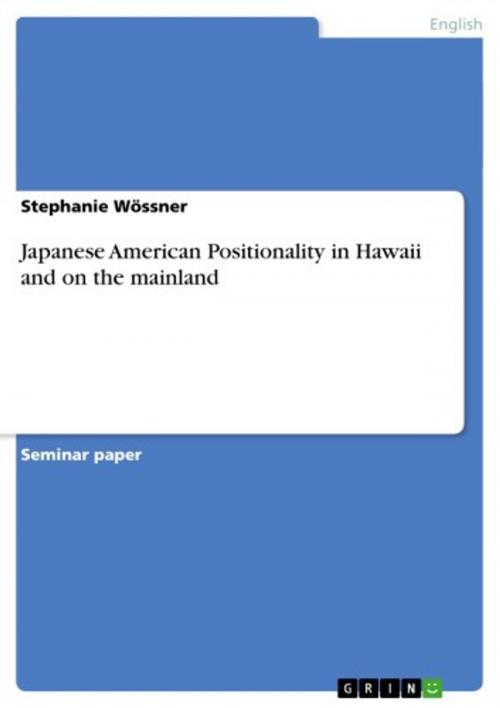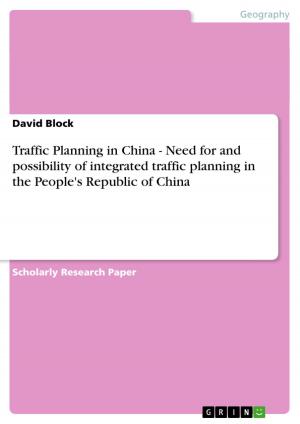Japanese American Positionality in Hawaii and on the mainland
Nonfiction, Entertainment, Drama, Anthologies| Author: | Stephanie Wössner | ISBN: | 9783640475797 |
| Publisher: | GRIN Publishing | Publication: | November 20, 2009 |
| Imprint: | GRIN Publishing | Language: | English |
| Author: | Stephanie Wössner |
| ISBN: | 9783640475797 |
| Publisher: | GRIN Publishing |
| Publication: | November 20, 2009 |
| Imprint: | GRIN Publishing |
| Language: | English |
Seminar paper from the year 2002 in the subject American Studies - Culture and Applied Geography, grade: A-, San Francisco State University (Ethnic Studies), course: AAS 710 Critical Approaches, language: English, abstract: From the beginning of the Twentieth Century, there have been quite a number of watershed events in American as well as World History. The term 'watershed' refers to a turning point in history. Examples are the Great Depression in the 1930s, World War Two in the 1940s, the Cold War beginning in the 1950s, the Civil Rights Movements in the US (and Third World Liberation Movements, their international counterparts) beginning in the 1960s, the downfall of communism and the rise of terrorism in the 1980s, and 9/11 in 2001. Those watersheds have had political, social and economic consequences on different groups and in different spheres, ranging from local to global dimensions. Japanese Americans and their position in American society were effected by all those watershed events. Western Colonialism in Asia envisioned the Japanese as the primitive 'Other' of the modern United States1. After having opened Japan by force in 1853, the US welcomed Japanese immigrants for a short time as a cheap source of labor. Long before the Great Depression hit the United States, however, anti-Japanese American sentiment, which was due to racial hatred and supposed economic competition, grew bigger and bigger, culminating in the Oriental Exclusion Act of 1924. During the Second World War, Japanese Americans residing primarily on the West Coast were put into internment camps. Dubbed a 'military necessity,' this internment of approximately 110.000 persons of Japanese ancestry, a majority of whom were American citizens, was, in reality, solely triggered by racial hatred. In the 1950s, during the Cold War, Japan, as Asia's only democracy, switched roles with Communist China and became an ally of the United States. This had immediate consequences on the attitude towards Japanese Americans in the US. The Civil Rights Movement and the Third World Liberation Movements were closely linked to the Cold War in that of all the anti-communist countries, the United States was the only one which had not been economically ruined by the preceding war. Thus, the United States was expected to be the guardian of democracy and had to live up to its proclaimed ideals of equality and freedom. The Cold War and the Civil Rights Movement gave Asian Americans in general, and Japanese Americans in particular, unprecedented opportunities, such as electoral empowerment, the repeal of exclusion laws, and to a certain extent social mobility. [...]
http://www.steffi-woessner.de
Seminar paper from the year 2002 in the subject American Studies - Culture and Applied Geography, grade: A-, San Francisco State University (Ethnic Studies), course: AAS 710 Critical Approaches, language: English, abstract: From the beginning of the Twentieth Century, there have been quite a number of watershed events in American as well as World History. The term 'watershed' refers to a turning point in history. Examples are the Great Depression in the 1930s, World War Two in the 1940s, the Cold War beginning in the 1950s, the Civil Rights Movements in the US (and Third World Liberation Movements, their international counterparts) beginning in the 1960s, the downfall of communism and the rise of terrorism in the 1980s, and 9/11 in 2001. Those watersheds have had political, social and economic consequences on different groups and in different spheres, ranging from local to global dimensions. Japanese Americans and their position in American society were effected by all those watershed events. Western Colonialism in Asia envisioned the Japanese as the primitive 'Other' of the modern United States1. After having opened Japan by force in 1853, the US welcomed Japanese immigrants for a short time as a cheap source of labor. Long before the Great Depression hit the United States, however, anti-Japanese American sentiment, which was due to racial hatred and supposed economic competition, grew bigger and bigger, culminating in the Oriental Exclusion Act of 1924. During the Second World War, Japanese Americans residing primarily on the West Coast were put into internment camps. Dubbed a 'military necessity,' this internment of approximately 110.000 persons of Japanese ancestry, a majority of whom were American citizens, was, in reality, solely triggered by racial hatred. In the 1950s, during the Cold War, Japan, as Asia's only democracy, switched roles with Communist China and became an ally of the United States. This had immediate consequences on the attitude towards Japanese Americans in the US. The Civil Rights Movement and the Third World Liberation Movements were closely linked to the Cold War in that of all the anti-communist countries, the United States was the only one which had not been economically ruined by the preceding war. Thus, the United States was expected to be the guardian of democracy and had to live up to its proclaimed ideals of equality and freedom. The Cold War and the Civil Rights Movement gave Asian Americans in general, and Japanese Americans in particular, unprecedented opportunities, such as electoral empowerment, the repeal of exclusion laws, and to a certain extent social mobility. [...]
http://www.steffi-woessner.de















